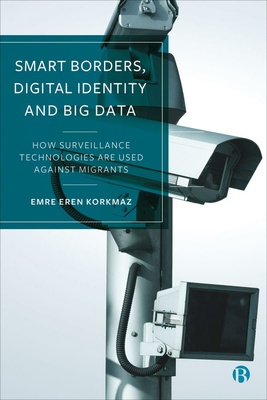Various war technologies are tested on migrants under the disguise of ‘smart borders’. This is not only a threat to migrants but also to regional and global peace.
What we have observed in Gaza in the last four months proves this argument. The Israeli military surveillance technologies that have been tested on Gaza for many years and sold to many other countries, including the UK, under the name of protecting borders against asylum-seekers, have actually contributed to the destruction of the territory.
Many technological solutions that stand out in the field of migration and border management fall within the scope of the technological product package known as ‘smart borders’. These technologies are developed by military/arms firms, and the solutions they offer not only violate the basic rights of refugees by refusing to recognise their right to seek asylum, but also militarise borders, put regional and global peace at risk and reinforce war preparations.
Israeli arms and security firms have long been marketing their surveillance technologies for border management as ‘successfully tested’ on Palestinians. Many products were first used to monitor and prevent Palestinians protests, mainly in Gaza, and this use was exploited to demonstrate the effectiveness of the products to potential customers. Gaza effectively served as an open-air prison, was kept under continuous surveillance and was a test ground for these technologies.
A significant proportion of the major technologies used in migration and border management relate to war. The critical importance of drones has become all too apparent in the Armenian–Azerbaijani and the Ukrainian–Russian wars, as well as in so-called anti-terrorism operations undertaken by various countries. As dancing robots start performing sentry duties and shooting practice, we will soon be seeing robots in the battlefield as well. At the same time the reinforcement of suppression and control mechanisms increase the risk of war, making it more difficult for disputes among countries to be resolved in a peaceful and diplomatic manner.
These ‘solutions’, including such tools as artificial intelligence algorithms, unmanned aerial vehicles, facial recognition systems, satellite images, sensors and mobile phone/social media data analyses, make it possible to control activities beyond physical borders and to detect and prevent immigrants before they even reach them. Elbit, an Israeli security company, established an advanced surveillance system in the US that can detect people approaching a border from 7.5 miles away. Cellebrite, another Israeli surveillance company, can analyse all available and deleted data on immigrants’ phones and scrutinise any suspicious activity on migration routes. These tools can equally be used to monitor the territories of neighbouring countries for intelligence-gathering purposes. Therefore, as the militarisation of borders gains pace with the latest technologies, it is obvious that this will create additional problems in maintaining peace at regional and global levels.
The most significant producers of smart border applications are military companies. In other words, those who produce the weapons and bombs that force refugees to flee their countries are the same companies that produce the tools for detecting those people in border areas. Leading weapon producers such as Lockheed Martin, Airbus, Safran and Thales, technology companies such as IBM, Amazon, Microsoft, Fujitsu and Accentura, all have investments in this area. This business involves large investments and massive profits.
However, an aggressive attitude adopted by actors who consider themselves to be stronger because of their technological superiority may backfire. The increasing virtualisation of borders makes it possible to monitor larger areas more effectively and with fewer personnel. However, every virtual system is susceptible to system errors, crashing and hacking. Investment in smart border applications in the name of stronger security may, paradoxically, render borders more vulnerable and leave the country in question open to attacks. This was proven by the Hamas attack on 7 October. But this security failure, which was based on trust in technological superiority, did not harm these surveillance military tech companies who have enjoyed profits from the subsequent destruction of Gaza from above.
Emre Eren Korkmaz is a research affiliate at the University of Oxford’s Centre on Migration, Policy and Society (COMPAS).
 Smart Borders, Digital Identity and Big Data by Emre Eren Korkmaz is available here for £80.00 on the Bristol University Press website.
Smart Borders, Digital Identity and Big Data by Emre Eren Korkmaz is available here for £80.00 on the Bristol University Press website.
Bristol University Press/Policy Press newsletter subscribers receive a 25% discount – sign up here.
Follow Transforming Society so we can let you know when new articles publish.
The views and opinions expressed on this blog site are solely those of the original blog post authors and other contributors. These views and opinions do not necessarily represent those of the Bristol University Press and/or any/all contributors to this site.
Image credit: Isaac Chou on Unsplash


